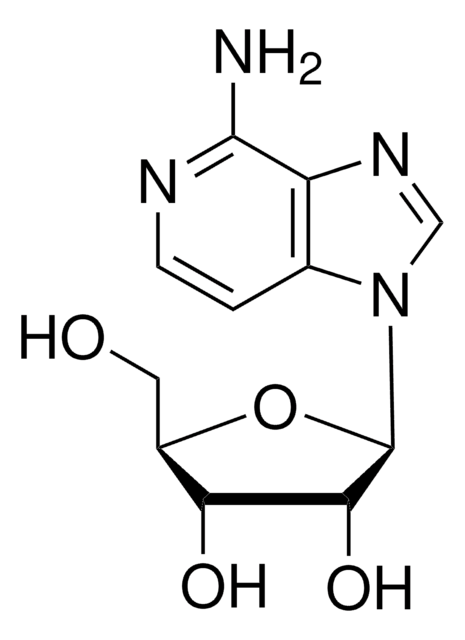SML0305
3-Deazaneplanocin A hydrochloride
≥97% (HPLC)
Sinonimo/i:
(-)-1-[(1R,4R,5S)-3-(Hydroxymethyl)-4,5-dihydroxy-2-cyclopenten-1-yl]4-aminoimidazo[4,5-c]pyridine hydrochloride, DZNep hydrochloride
About This Item
Prodotti consigliati
Saggio
≥97% (HPLC)
Forma fisica
powder
Attività ottica
[α]/D -88 to -108°, c = 0.1 in water
Condizioni di stoccaggio
desiccated
Colore
white to beige
Solubilità
H2O: ≥5 mg/mL
Condizioni di spedizione
wet ice
Temperatura di conservazione
−20°C
Stringa SMILE
Cl.Nc1nccc2n(cnc12)[C@@H]3C=C(CO)[C@@H](O)[C@H]3O
InChI
1S/C12H14N4O3.ClH/c13-12-9-7(1-2-14-12)16(5-15-9)8-3-6(4-17)10(18)11(8)19;/h1-3,5,8,10-11,17-19H,4H2,(H2,13,14);1H/t8-,10-,11+;/m1./s1
UNSKMHKAFPRFTI-FDKLLANESA-N
Descrizione generale
Applicazioni
Azioni biochim/fisiol
Caratteristiche e vantaggi
Codice della classe di stoccaggio
11 - Combustible Solids
Classe di pericolosità dell'acqua (WGK)
WGK 3
Punto d’infiammabilità (°F)
Not applicable
Punto d’infiammabilità (°C)
Not applicable
Certificati d'analisi (COA)
Cerca il Certificati d'analisi (COA) digitando il numero di lotto/batch corrispondente. I numeri di lotto o di batch sono stampati sull'etichetta dei prodotti dopo la parola ‘Lotto’ o ‘Batch’.
Possiedi già questo prodotto?
I documenti relativi ai prodotti acquistati recentemente sono disponibili nell’Archivio dei documenti.
I clienti hanno visto anche
Articoli
We offer a variety of small molecule research tools, such as transcription factor modulators, inhibitors of chromatin modifying enzymes, and agonists/antagonists for target identification and validation in gene regulation research; a selection of these research tools is shown below.
Il team dei nostri ricercatori vanta grande esperienza in tutte le aree della ricerca quali Life Science, scienza dei materiali, sintesi chimica, cromatografia, discipline analitiche, ecc..
Contatta l'Assistenza Tecnica.














